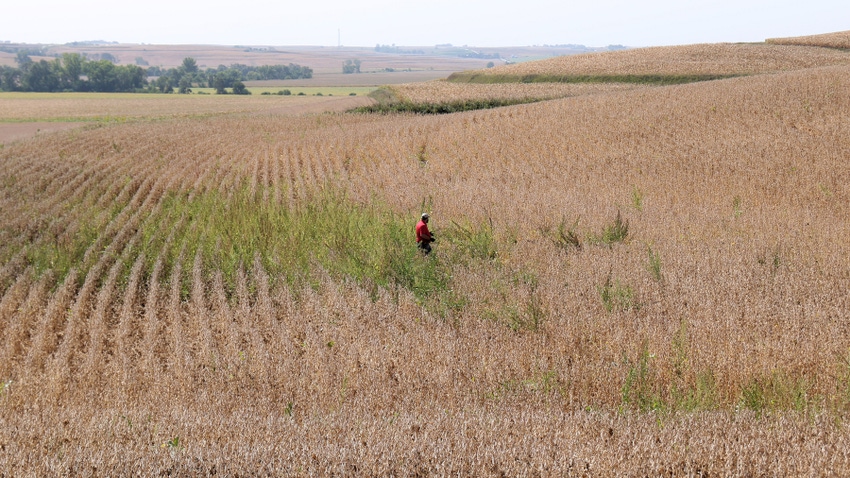November 8, 2023

Integrated Pest Management is a phrase most farmers have heard of as a catchy refrain for making smart decisions about controlling unwanted pests in fields. IPM is defined in the U.S. Code as “a sustainable approach to managing pests by combining biological, cultural, physical and chemical tools in a way that minimizes economic, health and environmental risks.”
Even though this definition seems easy to follow and something all Iowa farmers would want to adopt for the health of their operation and the environment, IPM is not always widely enacted by farmers. There are many reasons for this, such as environmental, social and economic challenges that make it easier to find a one-size-fits-all approach to management of pests regardless of the long-term effects.
This approach of simple over diverse has led to the development of resistance in all pests common for Iowa farmers including weeds, insects and disease pathogens. Pest resistance has formed within chemical, biological and transgenic pest control methodologies farmers use to combat their adverse effects on crops.
Pest resistance management needed
With these known resistances formed and shaping the landscape of Iowa agriculture, pest resistance management efforts are needed to slow the development of pest adaptation to chemical, genetic and agronomic control practices. In Iowa, a meeting was held in January 2015 titled “Resistance Management: Whose Problem and Whose Job,” which was led by the Iowa Department of Agriculture and Land Stewardship and the Iowa State University College of Agriculture and Life Sciences and attended by farmers, crop advisers, technology providers and commodity groups.
The January 2015 meeting resulted in a call for developing a statewide, voluntary Iowa Pest Resistance Management Plan, with broad participation from all sectors of Iowa agriculture. The primary goal of the IPRMP is to document and promote holistic and integrated management solutions that will effectively and sustainably control pests, and postpone or delay resistance development, foster methods of early detection, and then mitigate — to the extent possible — the spread of pest resistance.
The other component that was vital to the success of the IPRMP was recognizing that building and supporting connections within communities and identifying leaders within communities will be important factors in promoting sustainable changes. Planned community change does not just happen but often results from strong local leadership that can form a network of stakeholders who share similar values, and understanding about the problem and develop the capacity to work together and meet the challenge.
Weed resistance programs across Iowa
Four programs were initiated across the state of Iowa from 2017 to 2021 focusing on palmer amaranth and waterhemp herbicide resistance in Harrison County of west central Iowa, corn rootworm resistance to Bt trait technologies in northeast Iowa, weed resistance management in Story County in central Iowa, and soybean aphid resistance to pyrethroids in northwest Iowa. All four of these programs had different methods of information distribution and goals for successful implementation.
The Harrison County program became the most developed over time with delivering pest resistance management information through herbicide program field days over different years, local weed seed collections with herbicide resistance screening of populations, extensive media and Extension presentations, and the development and the release of an economic forecast modeling tool for pest resistance management in the county.
These projects and field days field not only involved local farmers but also members and stakeholders from industry, multiple government agencies and regulators, farmers from multiple states and university faculty from around the world.
This impact delivered by the Harrison County project was not achieved by just solid scientific information, but by the diversity and passion of its team members to look beyond individual interests and focus on how pest resistance management is really an “our” instead of a “your” problem. The Harrison County team was led by a local farmer-leader with a passion for pest resistance management as well as other farmers, agribusiness suppliers, commodity and farm organization representatives, ag lenders, crop consultants and university Extension.
The team collectively showed that having a consistent message on pest resistance management across all ag organizations can have influence over communities’ and farmers’ decision-making. There are no simple or easy solutions to pest resistance, but as a community farmers need to face the problem — knowing it is a long-term issue that will take persistence to achieve results and not a one-time event for success.
The Iowa Pest Resistance Management Plan started with a goal of reaching farmers across Iowa with a message that to slow the development of resistance in weeds, insects and diseases, and to mitigate resistance when it arises takes an individual and community effort to solve this “wicked problem.”
The problem of pest resistance is far from solved — but by looking at the problem with the perspective that “we” can accomplish goals, gives renewed hope and vision for the future. As Paul Lasley, a retired Iowa State University rural sociologist, once said, “Some things are too big for anyone to accomplish alone and too important not to try to do together.”
The Iowa Pest Resistance Management Plan is currently developing Phase II protocols to continue work focused on economic and communication fundamentals within pest resistance management.
About the Author(s)
You May Also Like






